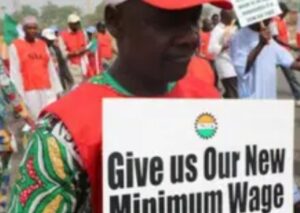Minimum Wage Controversy: FG Faces Backlash Over Selective Payments
Minimum Wage Controversy: FG Faces Backlash Over Selective Payments

Concerns are growing over what appears to be selective implementation of the new N70,000 minimum wage by the Federal Government, leading to renewed tension among federal public sector employees. Many workers who have yet to receive the payment are expressing frustration over this situation.
Employees from various Ministries, Departments, and Agencies (MDAs), including those at federal universities, have voiced their discontent, labeling the government’s actions as insensitive during a time when its policies have already contributed to widespread hardship and hunger.
While officials from the Accountant-General’s office stated that the new minimum wage was included in the September salaries, the Budget Office indicated that a uniform N40,000 was disbursed to all federal workers, a claim that many employees dispute.
President Bola Tinubu officially enacted the N70,000 minimum wage on July 18, 2024, following lengthy negotiations involving representatives from the government, Organized Private Sector (OPS), and labor unions, including the Nigeria Labour Congress (NLC) and the Trade Union Congress of Nigeria (TUC).
An anonymous employee from an MDA expressed their frustration: “We are completely disillusioned. It feels like the government is indifferent to our plight. The removal of the fuel subsidy has already placed immense burdens on us, and to add insult to injury, the minimum wage that has been law since July is not being implemented.”
They further highlighted disparities in salary adjustments, noting that some core civil service employees have received increases while others have not. “This selective payment is discriminatory and perpetuates economic bondage,” they lamented. Many workers are forced to sleep in their offices or walk long distances to work due to financial constraints, and some are going hungry or skipping meals to cope.
The situation is exacerbated by rising costs of living, including increased petrol prices and electricity tariffs, which have diminished the value of the unimplemented minimum wage. “How are we supposed to survive this crisis?” one worker asked. “Essential goods are becoming more expensive without any government support. It’s cruel and unjust.”
A source from the Budget and National Planning Ministry, speaking anonymously, clarified that the N40,000 payment was intended as a temporary measure to assist federal staff until the official minimum wage framework is finalized. Some federal employees confirmed receiving the extra N40,000 in their September paychecks.
However, a recent explanatory note from the Federal Government regarding the N40,000 payment described it merely as a provisional solution while awaiting the proper implementation of the new minimum wage.
TRENDING SONGS
 WOMAN REVEALS HOW PATIENCE AND TIMING HELPED HER BUILD A PEACEFUL FIVE-YEAR MARRIAGE
WOMAN REVEALS HOW PATIENCE AND TIMING HELPED HER BUILD A PEACEFUL FIVE-YEAR MARRIAGE
 How N100m Was Mistakenly Paid Into Egbetokun’s Son’s Personal Account — FPRO
How N100m Was Mistakenly Paid Into Egbetokun’s Son’s Personal Account — FPRO
 RCCG PASTOR ANGRY OVER CALLING Him“MR” INSTEAD OF “DR,” DECLARES CURSE ONLINE
RCCG PASTOR ANGRY OVER CALLING Him“MR” INSTEAD OF “DR,” DECLARES CURSE ONLINE
 NPMA Appeals to Nigerian Government for Compensation After Lagos Market Fire
NPMA Appeals to Nigerian Government for Compensation After Lagos Market Fire
 Rest Every Four Hours, FRSC Issues Safety Guide for Fasting Motorists
Rest Every Four Hours, FRSC Issues Safety Guide for Fasting Motorists
 NNPC Boss Ojulari Bags UK Energy Institute Fellowship
NNPC Boss Ojulari Bags UK Energy Institute Fellowship
 Shock in Anambra: Bride Disappears Moments Before Wedding
Shock in Anambra: Bride Disappears Moments Before Wedding
 Nigerian Woman Returns ₦330 Million Accidentally Credited to Her Account
Nigerian Woman Returns ₦330 Million Accidentally Credited to Her Account
 APC Don Reach Morocco?’ VeryDarkMan Reacts to Seyi Tinubu Poster
APC Don Reach Morocco?’ VeryDarkMan Reacts to Seyi Tinubu Poster
 Bride Breaks Down in Tears as Wedding Meals Were Kept Secretly While Guests Go Home Hungry
Bride Breaks Down in Tears as Wedding Meals Were Kept Secretly While Guests Go Home Hungry
Share this post with your friends on ![]()













